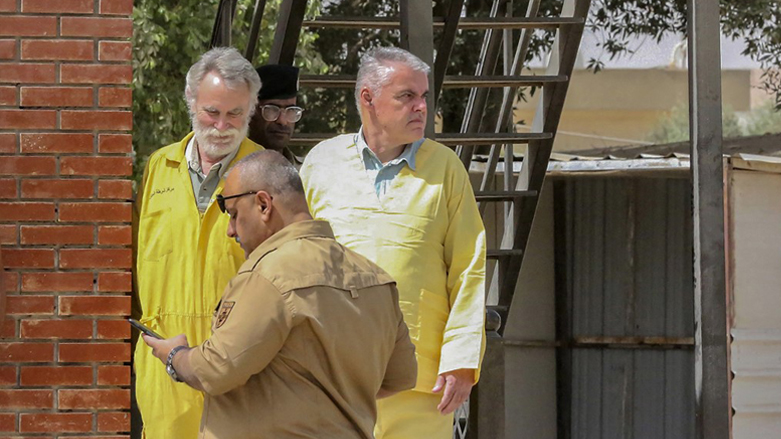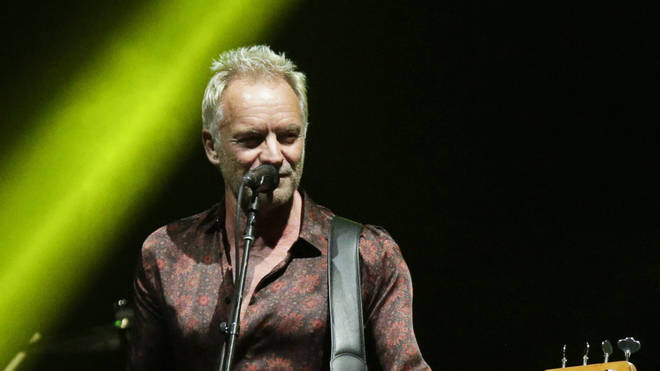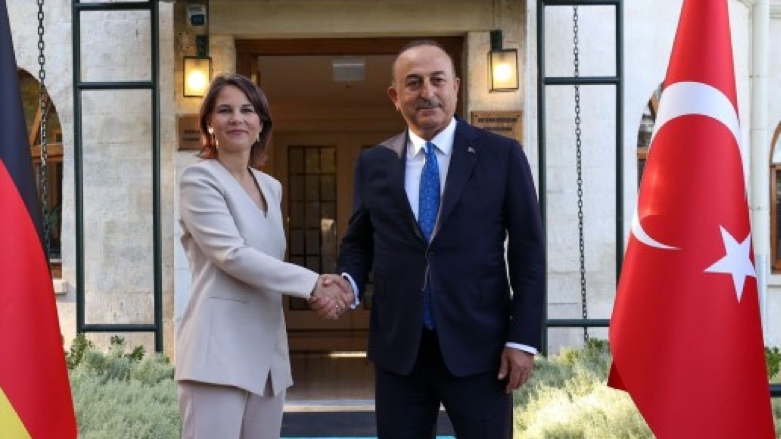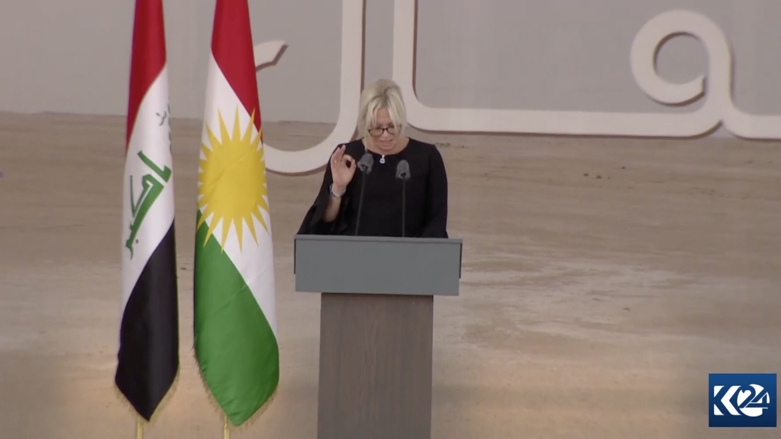It’s possible that I shall make an ass of myself. But in that case one can always get out of it with a little dialectic. I have, of course, so worded my proposition as to be right either way (K.Marx, Letter to F.Engels on the Indian Mutiny)
Sunday, July 31, 2022
‘The world will change’: England’s soccer team sweeps to Women’s Euro 2022 title
England takes home its first major tournament win in 56
years for either men or women in front of record crowd at
London’s Wembley Stadium

AFP — England manager Sarina Wiegman said “the world will change” for her players after the Lionesses, the national women’s soccer team, won Euro 2022 with a 2-1 extra-time victory over Germany at sold out London’s Wembley Stadium on Sunday.
In front of a crowd of 87,192, a record for any match in the history of the European Championships, Chloe Kelly scored the winning goal in the 110th minute to deliver the English women their first ever major tournament win.
“The world will change, we know that,” said Wiegman, whose post-match press conference was interrupted by the England squad singing “football’s coming home!”
“We change society and that’s what we want, that’s so much more than football,” she said. “Winning is what we are here for, our job is to do as good as possible, but through football you can make changes in society and that’s what we are here for.”
Kelly only just made Wiegman’s squad after fighting back from an anterior cruciate ligament tear to be fit in time for the tournament and made herself a national hero by being in the right place to pounce when Germany failed to clear a corner.
The Manchester City winger tore off her shirt in celebration in scenes reminiscent of Brandi Chastain’s famous reaction to scoring the winning penalty at the 1999 World Cup for the USA.

Dream comes true
“This is what dreams are made of, as a young girl watching women’s football,” said Kelly, who broke off a post-match interview to join in a chorus of “Sweet Caroline” with the crowd and her teammates.
“Thank you for everyone who played a part in my rehab. I always believed I’d be here, but to be here and score the winner, wow. These girls are amazing,” she said.
England looked set for victory in the 90 minutes when substitute Ella Toone’s sublime chip over Merle Frohms put the hosts in front.
Germany showed remarkable resilience to bounce back as Lina Magull leveled 11 minutes from time.
But 56 years on from England’s last major tournament win in either the men’s or women’s game, they were not to be denied a major tournament success.
Queen Elizabeth II led the tributes to the Lionesses, calling them “an inspiration for girls and women today, and for future generations.”

Germany’s misfortune
Fortune did not favor Germany, who lost captain and top goalscorer Alexandra Popp to a muscle injury in the warm-up.
German manager Martina Voss-Tecklenburg was also furious that a penalty was not awarded in the first half for a handball by England captain Leah Williamson.
But England felt their time for some luck was due 12 months on from the Three Lions’ defeat on penalties to Italy in the Euro 2020 men’s final.
“I can’t stop crying. We talk and we talk and we’ve finally done it,” said Williamson. “It’s the proudest moment of my life. I’m taking in every single second because I’ll want to relive this for a long time.”
Under Wiegman, England are unbeaten in 20 games but were pushed to the limit by the eight-time winners Germany despite missing the massive presence of Popp, who had scored six goals in five games en route to the final.
Strength in depth has been one of the key features of England’s success under Wiegman and the Dutch coach turned to Alessia Russo and Toone to change the game as they did in the quarter-final win over Spain.

The changes worked to perfection once more as Toone timed her run through the heart of the German defense to latch onto Keira Walsh’s through ball, showing great composure to coolly lift the ball over Frohms.
Lesser sides than the eight-time champions would have been broken, but Germany immediately pushed forward in search of an equalizer.
The excellent Magull smashed a shot off the post and Popp’s replacement Lea Schueller should have converted the rebound rather than rolling the ball into the arms of the grateful Mary Earps.
Voss-Tecklenburg’s side was not to be denied, though, and fittingly it was Magull who sent the game to extra-time as the Bayern Munich midfielder slotted Tabea Wassmuth’s cross into the roof of the net.
Both sides felt the pace of a physical encounter in the extra 30 minutes.
England just had enough left in the tank to finally get the job done as Germany failed to deal with the second ball from a corner and Kelly’s flicked the ball home.
After decades of disappointment, a major tournament trophy has come home for England fans.
We pretend my story is rare among conservatives. It's not, and Republicans should stop acting like it.

Sam Zaleski had an abortion in the last few weeks of her senior year at a Catholic school in southeast Michigan. "It took my own pregnancy for me to accept that I was in a controlling relationship," she writes. | Allison Shelley
Opinion by SAM ZALESKI
07/31/2022
POLITICO
Magazine
WOMEN AND POLITICS
Sam Zaleski has a decade of experience working in political campaigns and advocacy with expertise in media, research, and analytics. In 2018, she was named a rising star by Campaigns & Elections magazine.
In the last few weeks of the school year during my senior year at a respected Catholic school in southeast Michigan, our religion teacher had our class watch “Juno.” In my Catholic community, “Juno” was seen as a pro-life story: The main character learns she is pregnant at 16 and ultimately chooses adoption.
It was during that class, watching “Juno,” that I first experienced the nausea. In the next few weeks, that nausea turned into vomiting, and then into dehydration. I was hospitalized, and soon learned the reason for these vomiting spells. I was pregnant.
I ultimately had an abortion, and I don’t regret the decision. It made me a firm believer in the importance of abortion rights — for economic mobility, for autonomy, for mental health. I did choose life when I chose to have an abortion — my own life.
That decision ended up setting me on a path where I’d spend the better part of my career committed to helping Republicans win elections as a pollster, data analyst and strategist. As a result, I know numbers, and I know politics. And I know that statistically, I can’t be that rare; many women who have supported Republicans have had abortions. Many women who agree with various conservative policies, too, have had abortions. There are men and women in the party, too, who might not have personal experience with abortion, but still have complicated feelings about the procedure.
“Unlike Juno, I did not have a loving, nerdy best friend as the father, and unlike her, I did not want to go through parenting or a long adoption process with him.”
Still, though, Republican-dominated legislatures continue to pass abortion bans with very few exceptions, and Republican politicians either ignore the issue or articulate extreme and alienating views.
The party’s lack of compassion on the topic is harmful. There is a growing mismatch between the party’s stance on abortion and the complex beliefs voters in this country have on abortion. And while we’re deep into the midterms, there is still an opportunity to pull back the rhetoric and support empathetic, commonsense ways to provide pregnant women with the care they deserve.
My own abortion is a big reason why I have complicated views on the topic, and a big reason I find myself at odds with typical Republican policies and messaging on the subject.

A quote from Supreme Court Justice Ruth Bader Ginsburg is painted on the wall in the waiting room of a women's health clinic in Indiana which provides reproductive healthcare for women including providing abortions. | Scott Olson/Getty Images
Despite probably realizing it on some subconscious level, it took my own pregnancy for me to accept that I was in a controlling and unhealthy relationship. My boyfriend had broken down so much of my self-worth and confidence that I didn’t have the courage to tell myself the truth about the relationship. But that pregnancy forced me to face it all. Having a child links you to their father for the rest of your life, and this link gives him control over that child in ways you can’t predict or stop. For days after leaving the hospital, all I could see were the red flags I had been ignoring, including one harrowing incident I was so ashamed of I kept it hidden. Unlike Juno, I did not have a loving, nerdy best friend as the father, and unlike her, I did not want to go through parenting or a long adoption process with him.
I had an abortion despite the shame I felt about my circumstances. I had an abortion despite a high school friend writing “baby killer” on my Facebook wall. I had an abortion despite feeling so conflicted due to my Catholic education and confused about how this choice could turn me into a bad person. I had an abortion without a supportive partner or community. I wasn’t Juno: I had an abortion.
At the time, I was scared and alone and confused. I certainly didn’t recognize the privilege I had. The clinic was two miles away from my childhood home. The procedure was affordable. The staff was kind and professional. The abortion was legal and safe and regulated. And I left for my four-year college three months later.
My abortion story, and everything that happened afterward, is the kind of story that makes political strategists’ jobs very difficult. As an expert in political data, my job is to put people in boxes. Are you a young person with an electric vehicle that you drive around an urban area? You’re likely a Democrat, and I bet you care about climate change. Are you white, male and the owner of a pickup truck that bumps down country roads? Then you probably have a Donald Trump bumper sticker on that truck, and you probably aren’t happy about rising gas prices. We can even use the most sophisticated data to find unique cross-sections of voters, those hard-to-reach boxes, such as Republicans who are pro-gun control, or Democrats who don’t believe in defunding the police. This is how my world works.
“Republicans talk as if abortion is something only Democrats seek and undergo. Not in my home. Not in my church. Not in my community.”
The problem with these boxes is that most people are actually far more complex than they appear in even the data. Abortions polls are notoriously inconsistent and vary wildly depending on how questions are asked. Most people hold a complex set of beliefs and ideologies across a spectrum, and I fear that we can’t own this complexity out loud in general, but especially on abortion, because of how the abortion debate has become increasingly partisan in recent years. If you’re a Republican, you show up in the surveys as being anti-abortion and in favor of fewer exceptions to abortion bans than Democrats. If you’re a Democrat, you’re probably in favor of abortion rights and more exceptions to abortion bans. If you, like many Americans, fall into the very wide gray space, we might see you show up across some of the more nuanced surveys, but we likely don’t have much more specific knowledge about your views.
 |
| ELIMINATE THE HYDE AMENDMENT; BARBARA BUSH |
Beyond the statistics on who gets abortions, there is also some agreement across the two parties on who should have access to abortion. According to Pew, 61 percent of voters believe abortion should be legal in some or all cases. Only 8 percent of voters believe abortion should be illegal in all cases. Given these numbers, it should seem that Democrats and Republicans in red states and blue states alike should get to work on deciding what the restrictions and exceptions should be; a law that bans nearly all abortions is unlikely to align with popular opinion, no matter how red the state.
In the community I’ve been a part of, I don’t see people coming forward to share their personal stories with abortion. And why would they? It’s clearly not safe to have had an abortion — and it’s particularly not safe to say it out loud.
If we don’t allow people access to this context about their lives and nuanced feelings on abortion, if we don’t see people step outside of these boxes in a real way, then how can Republicans meaningfully engage on the issue of abortion access? If we can’t even talk about it, how can we legislate on it? If you don’t truly think you know someone who has had an abortion, how can you empathize?
In the years since my abortion, I haven’t felt safe to tell this story. Frankly, I still don’t. I know there are many, many more people with stories like mine who don’t have the privilege to speak out. I hope we make it safe for them to do so because yes, this is happening in your home. Yes, this is happening in your church. Yes, this is happening in your community.
Perhaps you’ll find empathy for me as I step outside of this box. Perhaps you’ll even consider whether your own box is serving you and the people around you. I’m a married, white woman, who lives in the suburbs, has worked for many Republicans, and I believe in access to safe, legal abortion.
After the execution of Tomohiro Kato, coincidentally with that of Myanmar dissidents, the Justice and Peace Council of the Catholic Bishops’ Conference of Japan warns that, “The violence of the death penalty can never build a peaceful society. It is a barbarity that goes against the times and creates new violence.”

Tokyo (AsiaNews) – In Asia the past few months have been marked by the death penalty. In Myanmar, four political opponents were executed last week, the first death sentences carried out in the country in more than thirty years. In Japan, the authorities on Tuesday executed Tomohiro Kato, a man who stabbed seven people to death in 2008, while in Singapore, the end of the pandemic saw the latest of five executions carried out over the past five months.
Against this backdrop, the Justice and Peace Council of the Catholic Church in Japan issued a statement that renews a broader reflection on the magisterium of the Church regarding the death penalty, starting with Japan itself.
“We express our deep sorrow and our strongest objection to the execution on 26 July 2022 of Tomohiro Kato, 39, who was held at the Tokyo detention centre. His precious life, in fact, was taken away at the hands of the State.”
The Council notes that in 2016, on 26 July, Japan mourned the death of 19 people at a facility or disabled people in Sagamihara. It was “an unprecedented episode of murder and injury. We prayed for the victims and renewed our conviction that no life is not worth living.”
Two years later, on 26 July 2018, six death row inmates linked to the terrorist group Aum Shinrikyo were executed at the same time. “We are horrified by the fact that the state chose this same day once again to end life viewed as not worth living,” reads the note.
“In light of the Gospel revealed by Jesus Christ, the Catholic Church firmly believes that the life of every person is precious and that, however serious the sin a person may have committed, their dignity is never forfeit.
"Given her mission to protect every life, she not only teaches that the death penalty is an unacceptable attack on the inviolability and dignity of the person, but she is also determined to work for its abolition throughout the world.
“At a time when the rigorous application of the law has made it possible to prevent the recurrence of crimes and guarantee the security of society by means other than the death penalty, we believe that the death penalty has lost its raison d'être because of the preciousness of human life.”
The Council’s also notes that “for the first time in decades”, the death penalty was carried out in Myanmar, an act condemned by the international community. “As the Japanese government stated, there is serious concern that this will ‘lead to further isolation’. Yet, we are ‘gravely concerned’ that [. . .] the Japanese government set out on the same path and carried out an outrageous act of self-degradation of its international position.
“The violence of the death penalty can never build a peaceful society. It is a barbarity that goes against the times and creates new violence."
“Having learnt from Jesus Christ the truth that every life is precious, we nourish the hope of conversion, forgiveness and true reconciliation. Because even if this is hard, it is not at all impossible.
"In unison with Pope Francis and the Catholic Church around the world, and uniting our hearts and minds with people of good will around the world who respect human rights, we will continue to press for the abolition of the death penalty, a cruel and unmerciful punishment, and for an immediate moratorium on executions.”
AFP 2022/07/27

An Iraqi court has overturned the conviction and 15-year sentence handed to a British pensioner last month for antiquities smuggling, the retiree's lawyer said Tuesday.
James Fitton had been charged under a 2002 law against "intentionally taking or trying to take out of Iraq an antiquity," the maximum penalty for which under the country's legal code is death by hanging.
The conviction has been "overturned today by the Court of Cassation and my client will soon be free", lawyer Thaer Saoud told AFP.
The retiree's son-in-law, Sam Tasker, told AFP in a phone call that the family was "very pleased by the decision, but we are still waiting for his release."
Fitton stood trial alongside German national Volker Waldmann, who was acquitted. Both men had pleaded not guilty.
Fitton's lawyer launched the appeal just over a month ago.
According to statements from customs officers and witnesses, Fitton's baggage contained about a dozen stone fragments, pieces of pottery or ceramics.
When the judge in the original trial asked Fitton why he tried to take the artefacts out of Iraq, the retired geologist cited his "hobby" and said he did not mean to do anything illegal.
"I didn't realise that taking them was against the law," Fitton had said, adding that some of the ancient sites were open and unguarded.
But the judge in the original trial concluded there was criminal intent and sentenced Fitton to 15 years, rather than death, because of his "advanced age".
On his Facebook page on Tuesday, Fitton's lawyer published the judgement that had been handed down by the Court of Cassation, overturning the original verdict.
It said that the charge against Fitton had been cancelled, and that he would be freed for lack of evidence.
The court also ruled that there had been no "criminal intent" on the Briton's part, Saoud said.
He added that his client would be released "in the next few days, as soon as the proceedings are completed".
The Fitton case comes at a time when the war-ravaged country, whose tourism infrastructure is almost non-existent, is tentatively opening to visitors.
Iraq -- home to the famed city of Babylon in ancient Mesopotamia -- is seeking to safeguard its archaeological heritage amid a rampant market for smuggled artifacts.
The authorities crack down severely on attempts to deal in antiquities illegally.
Much of the country's ancient cultural heritage has been looted for decades because of the many conflicts it has suffered, particularly after the US-led invasion of 2003 that ousted dictator Saddam Hussein.
The arrival of the Islamic State group in 2014 boosted the illegal sale of antiquities as the jihadists sought to bolster their coffers by smuggling out and selling ancient pieces.
Rolex & Patek Philippe watches flood second-hand market after crypto valuations fell
The new rich became less rich and first things that get sold are luxury watches.
Belmont Lay | July 31, 2022

Rolex and Patek Philippe watches are flooding the second-hand market due to the collapse in cryptocurrencies, Bloomberg reported.
The supply of the most sought after watches, including the Rolex Daytona or Patek Nautilus 5711A, “is now much larger”, online-watch trading platform Chrono24 said in a statement.
The Germany-based Chrono24 attributed the flood of luxury watches to the recent depressed cryptocurrency valuations, which “has directly impacted pricing".
More than half a million watches are listed for sale on the Chrono24 website.
Rise and fall in tandem
Expensive watches were in demand when cryptocurrency valuations soared and minted a new class of luxury buyers -- including but not limited to crypto bros.
This led to the price increase for models, particularly from brands like Rolex, Audemars Piguet and Patek.
The reverse has happened with cryptocurrency valuations plummeting.
Chrono24 Co-CEO Tim Stracke called the pullback "a consolidation" as prices for the most sought after timepieces have fallen closer in line with similar watches.
With cheaper prices, more watches naturally exchanged hands between buyers and sellers.
Trading volumes on the platform linking dealers or private sellers with buyers have jumped more than 50 per cent in the first half 2022, Bloomberg reported.
Price floor still elevated
But the pullback in prices is nothing compared to its surge.
The price of a Patek Philippe Nautilus 5711A, which sells for about US$35,000 (S$48,320) at retail, surged to US$240,000 (S$331,334) in the first quarter, according to Chrono24.
It is now about US$190,000 (S$262,306).
The price increases have seen watches like the Girard-Perregaux Laureato, Cartier, Breitling, as well as nearly all models from the Omega Speedmaster collection go up in value.
All photos via Unsplash
Sting denounces Ukraine war and warns of threats to democracy
31 July 2022, 11:54

The musician interrupted a concert in Warsaw to deliver his message to the audience.
British musician Sting interrupted a concert in Poland on Saturday evening to warn his audience that democracy is under attack worldwide and to denounce the war in Ukraine as “an absurdity based upon a lie”.
He asked a popular Polish actor, Maciej Stuhr, to go on stage during the show in Warsaw to translate his warning that democracy is “in grave danger of being lost unless we defend it”.
“The alternative to democracy is a prison, a prison of the mind. The alternative to democracy is violence, oppression, imprisonment and silence,” Sting said and then ran his hand across his neck in a throat-cutting gesture.
The 70-year-old delivered his message in a country that borders Ukraine, where Russia launched its invasion on February 24. Tens of thousands of people have been killed and displaced millions displaced. Poland has become the place of refuge for more Ukrainians than any other country.
The war in the Ukraine is an absurdity based upon a lie. If we swallow that lie, the lie will eat us
“The war in the Ukraine is an absurdity based upon a lie. If we swallow that lie, the lie will eat us,” Sting said.
He appeared to be referring to justifications Russia has tried to give for its invasion, including a claim that it is seeking to “de-Nazify” Ukraine, a democracy led by a Jewish president.
Those in the audience at Warsaw’s National Stadium would have also understand a reference to their own country.
Sting drew strong applause in particular when he said that democracy is something messy and frustrating “but it is still worth fighting for”.
Poland’s populist government is often accused by the European Union and human rights organisations of eroding democratic norms with its efforts to tighten control over the courts and media, reduce the reproductive rights of women and engage in anti-LGBTQ rhetoric.
After his speech the singer performed Fragile, whose lyrics include the words that “nothing comes from violence and nothing ever could”.
By Press Association
By Natalia Zinets
07/31/22

Heavy Russian strikes hit the southern Ukrainian port city of Mykolaiv overnight and early on Sunday, killing the owner of one of the country's largest grain producing and exporting companies, the local governor said.
Oleksiy Vadatursky, founder and owner of agriculture company Nibulon and his wife, were killed in their home, Mykolaiv Governor Vitaliy Kim said on Telegram.
Headquartered in Mykolaiv, a strategically important city that borders the Russia-occupied Kherson region, Nibulon specializes in the production and export of wheat, barley and corn, and it has its own fleet and shipyard.
President Volodymyr Zelenskiy described Vadatursky's death as "a great loss for all of Ukraine", saying in a statement the businessman had been in the process of building a modern grain market involving a network of transhipment terminals and elevators.
Three people were also wounded in the attacks on Mikolaiv, the city's Mayor Oleksandr Senkevych told Ukrainian television, adding 12 missiles had hit homes and educational facilities. He earlier described the strikes as "probably the most powerful" on the city of the entire five-month-old war.
Up to 50 Grad rockets hit residential areas in another southern city, Nikopol, on Sunday morning, Dnipropetrovsk Governor Valentyn Reznichenko wrote on Telegram. One person was wounded.
Ukrainian forces struck the headquarters of Russia's Black Sea Fleet in Russian-held Sevastopol early on Sunday, the Crimean port city governor, Mikhail Razvozhayev told Russian media. Five members of staff were wounded in the attack when what was presumed to be a drone flew into the courtyard at the headquarters, he said.
Reuters could not independently verify the battlefield reports.
The Sevastopol attack coincided with Russia's Navy Day, which President Vladimir Putin marked by announcing that the Russian navy would receive what he called "formidable" hypersonic Zircon cruise missiles in coming months. Those missiles can travel at nine times the speed of sound.
He did not mention Ukraine directly.
Putin sent tens of thousands of troops over the border on Feb. 24, setting off a conflict that has killed thousands, uprooted millions and caused a deep strain in relations between Russia and the West.
The biggest conflict in Europe since World War Two has also stoked an energy and food crisis that is shaking the global economy. Both Ukraine and Russia are leading suppliers of grain.
HARVEST COULD BE HALVED
Zelenskiy said on Sunday the country may harvest only half its usual amount this year due to the invasion.
"Ukrainian harvest this year is under the threat to be twice less," suggesting half as much as usual, Zelenskiy wrote in English on Twitter. "Our main goal -- to prevent global food crisis caused by Russian invasion. Still grains find a way to be delivered alternatively," he added.
Ukraine has struggled to get its product to buyers via its Black Sea ports because of the war.
But an agreement signed under the stewardship of the United Nations and Turkey on July 22 provides for safe passage for ships carrying grain out of three southern Ukrainian ports.
There is a high possibility that the first grain-exporting ship will leave Ukraine's ports on Monday, a spokesperson for Turkish President Tayyip Erdogan said on Sunday.
EASTERN DANGER
In a televised address late on Saturday, Zelenskiy said hundreds of thousands of people were still exposed to fierce fighting in the Donbas region, which contains Donetsk and Luhansk provinces and which Russia seeks to control completely. Swathes of the Donbas were held before the invasion by Russian-backed separatists.
"Many refuse to leave but it still needs to be done," Zelenskiy said. "The more people leave the Donetsk region now, the fewer people the Russian army will have time to kill."
Russia on Sunday invited U.N. and Red Cross experts to probe the deaths of dozens of Ukrainian prisoners held by Moscow-backed separatists.
Ukraine and Russia have traded accusations over a missile strike or explosion early on Friday that appeared to have killed dozens of Ukrainian prisoners of war in the front-line town of Olenivka in eastern Donetsk.
Russia invited experts from the U.N. and Red Cross to probe the deaths "in the interests of conducting an objective investigation", the defence ministry said on Sunday.
The ministry had published a list of 50 Ukrainian prisoners of war killed and 73 wounded in what it said was a Ukrainian military strike with a U.S.-made High Mobility Artillery Rocket System (HIMARS).
Ukraine's armed forces denied responsibility, saying Russian artillery had attacked the prison to hide mistreatment there.
Reuters journalists confirmed some of the deaths at the prison, but could not immediately verify the differing versions of events.
Russia denies its forces have deliberately attacked civilians or committed war crimes in the invasion, which it calls a "special operation".
Ukraine's military said on Saturday more than 100 Russian soldiers had been killed and seven tanks destroyed in the south on Friday, including the Kherson region that is the focus of Kyiv's counteroffensive in that part of the country and a key link in Moscow's supply lines.
Rail traffic to Kherson over the Dnipro River had been cut, the military said, potentially further isolating Russian forces west of the river from supplies in occupied Crimea and the east.
Officials from the Russian-appointed administration running the Kherson region last week rejected Western and Ukrainian assessments that Russian forces there were now vulnerable.
Wladimir van Wilgenburg 2022/07/30

ERBIL (Kurdistan 24) – German Foreign Minister, Annalena Baerbock, on Friday during a visit to Turkey warned the Turkish government against a new operation in Syria, underling it would help ISIS and cause more pain for people.
“There is a right to self-defense, but it has narrow limits,” Baerbock said in a joint press conference with the Turkish FM Mevlut Cavusoglu in Istanbul, underlining the importance of international law.
“Hypothetical threats and preemptive strikes are not included in them,” she added.
“The consequences of military operations are almost always suffering,” she said.
In a statement on Thursday before her diplomatic trip to Greece and Turkey, she underlined that
“Turkey is an indispensable partner and is more closely linked to Germany than almost any other country.”
However, she underlined that she also would address “issues in Turkey on which we have fundamental differences at times, including the military interventions in northern Syria.”
But the Turkish FM Mevlüt Çavusoglu disagreed with her, and underlined that Turkish operations are only “anti-terrorist operations”, while claiming that military operations are only done against states, not insurgent groups.
Moreover, the Turkish FM also complained that Germany should do more against the Kurdistan Workers’ Party (PKK).
There is a large Kurdish community originally from the Kurdish majority southeast of Turkey (northern Kurdistan) living in Germany and many Kurdish organizations in Germany.
Read More: Court lifts travel ban, allowing German-Kurdish singer to leave Turkey
In the past, Kurds from Germany have also been arrested by the Turkish police, causing diplomatic tensions between Germany and Turkey.
But Baerbock underlined that the PKK is banned in Germany and that any crimes are prosecuted according to the rule of law.
Turkey has threatened to launch an operation in northern Syria since May. Syrian Kurdish and US officials have warned such an operation would undermine the fight against ISIS.
Read more: Renewed armed hostilities will undermine stability in Syria: EU Syria Envoy
So far, major stakeholders in the conflict, such as Russia and the US have opposed a Turkish operation. The European Union also is opposed to a new operation.
Austrian expert on Kurdish affairs, Dr. Thomas Schmidinger, told Kurdistan 24 that initially Ukraine dominated the German position towards Turkey completely.
“Meanwhile the German government realized that other conflict zones also play an important role for the future of Europe and that another Turkish invasion would cause hundreds of thousands of new refugees and that at least a part of these would end up in Europe,” he said.
German FM Baerbock in her earlier statement also thanked Turkey for mediating a deal between Russia and Ukraine on exporting Ukrainian grain, praising it as a glimmer of hope to millions to avoid a hunger crisis.
Read more: Blinken lauds deal to export Ukrainian grain, underscoring Turkey’s new importance on world stage
“Minister Baerbock always sayed that she wants a value driven feminist foreign policy. Well, that's how such a policy looks like. So it's rather the question why she did not defend Rojava (northeast Syria) against Turkey until recently than why she does it now,” he concluded.
Wladimir van Wilgenburg

UN envoy for Iraq Jeanine Hennis-Plasschaert spoke at a special ceremony on July 30, 2022, for the return of the bodies of 100 Barzani genocide victims (Photo: Kurdistan 24)
ERBIL (Kurdistan 24) – Jeanine Hennis-Plasschaert, the Special Representative of the UN Secretary-General for Iraq and Head of the United Nations Assistance Mission for Iraq (UNAMI), participated in a special ceremony held on Saturday for the return of the remains of 100 Barzani genocide victims murdered by the Saddam Hussein regime in 1983.
Saturday marked the 39th anniversary of the 1983 genocide, in which thousands of men and boys from the Barzani tribe were systematically murdered by Saddam Hussein’s Ba’ath regime.
The bodies of 100 victims arrived at the Kurdistan Region’s Erbil International Airport on Saturday. They will be reburied in the Barzan region on Sunday.
“We are here to commemorate, with great sadness, the enforced disappearance - 39 years ago - of 8,000 Barzani men and boys. They vanished, never to be seen again,” UN Envoy Jeanine Hennis-Plasschaert, said in her speech.
“And as we remember those who tragically lost their lives, our thoughts are also with their families and friends. To date, many of them are still waiting for the truth to come out, having cruelly been denied the opportunity to lay their loved ones to rest,” she said.
“There are simply no words that can describe the feelings of profound despair. Today, we also memorialize the return of 100 Barzanis, the third of its kind. Between 2004 and 2005, 500 missing loved ones were returned to their ancestral homes,” she added.
“In 2011, another 93 were brought home to their final resting place. And while the search goes on, we express our hope that every last father, brother, uncle, and son will be found.”
Hennis-Plasschaert also underlined that the ceremony served “as a stark reminder” that such horrific acts are never to be repeated.
Moreover, she added that the victims should be honored by working together.
“It is the only way to begin to heal the deep wounds left by decades of conflict and division, to set the conditions which allow all people to prosper, in safety and security, with respect for one another.”
